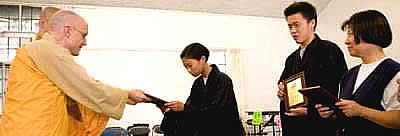 |
|
Reflection on the
Buddhist Knowledge Contest
Lotus Lee, aged 13, from Gold Sage Monastery
In May, when DM Heng Yun asked me if I wanted to sign up for the Buddhist Knowledge Contest at CTTB’s 30 th Anniversary Celebration in July, I was totally for it. After my experience with Jeopardy at summer camp the previous year, I definitely wanted to try it out.
From my previous experience with Jeopardy, summer camp style, it involved no preparation. You just used whatever you knew beforehand and went and had fun. Although it was a rather primitive form of Jeopardy, it was heated and exhilarating, full of laughter and jokes. Everyone thoroughly enjoyed it. I thought it would be the same this time around too.
To my surprise, a few weeks later, my mom got an email about the contest that had at least two or three megabytes of attachments worth of study material. All my mom could mutter was, “I’m too old for this!!” I just stared. And so began the studying. It was rather like cramming for finals at med school. Until then, I didn’t realize just how little I knew about Buddhism. For example, I had no idea that the first sutra to be translated from Sanskrit to Chinese was The Sutra in Forty-Two Sections, and that there are twelve kinds of conduct in ascetic practice. But because of this contest, I greatly broadened my knowledge of Buddhism.
In the past, I never really cared much about Chinese idioms, as I never really used them. So when I saw the pages filled with idioms, I nearly keeled over. I was afraid I wouldn’t be able to memorize all their definitions. But through studying, I learned a lot about Chinese idioms and their history, as well as how to use them properly.

The 30th Anniversary Celebration was the biggest event for CTTB this year. From the moment we drove through the mountain gate, I could feel the excitement sparkling in the air. I had never seen so many people at CTTB. There were many commemorative events throughout the day, such as lectures, lion and dragon dance, a parade by the boy’s summer camp, liberating life, and a lot more. The Buddhist Knowledge Contest was scheduled at one pm in the Dao Yuan Hall.
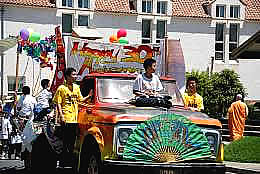
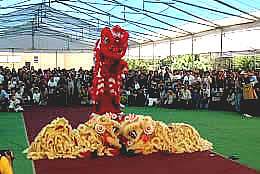
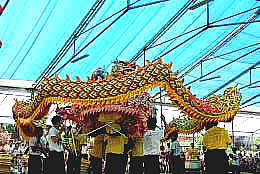
As we were setting up the chairs at the competition site, I overheard competitors desperately trying to recall the three definitions of “Bhikshu.” Everyone was very worked up. Finally, the main event began. We met our fellow team members—our team leader was Mr. Qing-Nan Wang, a teacher from boy’s school, and Michael Hsieh, an alumni from boy’s school. The rules for this contest were very much like television Jeopardy, with a few modifications. There were ten teams, with four people to each one. My team’s name was Nan Hua.

The categories for questions included precepts, sutras, Buddhist history, and Buddhist idioms. There were two forms of questions: multiple choice and Q&A. The multiple choice was the most nerve-wracking, not in the question but in the required method of answering. One had to state the correct number of the choice before stating the answer. The question could also have multiple correct answers. So if you were too hasty and pressed the buzzer too soon, you would most likely lose five points for your team. Many people—including me—lost points because of this rule. On that first round my team did really well, with a total score of 160 points, earning our spot in the final round.
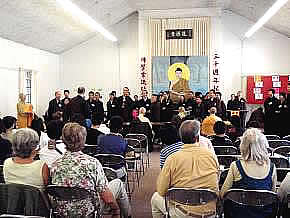
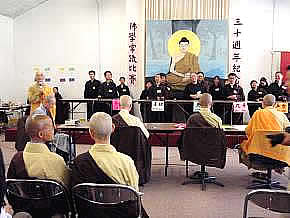
The finals were much more heated than the prelims. People were slamming buzzers left and right without even waiting for Jin Jing Shr to finish reading the question. My mom and I had agreed earlier that keeping the score stable was way better than losing points right and left, so the both of us played it safe. In fact, the whole team seemed to slow down. Except for a five point loss at the beginning (my fault) our score stayed relatively the same. For a while. Then our team started picking it up. Our score began climbing steadily until the end, where we came in a close second place.
I think one of the most important things I learned from this competition was that one should not seek to win and be greedy for the title. I found that whenever I was thinking about winning, I would often press the buzzer too early and/or get the answer wrong. But when I stopped thinking about winning and just concentrated on the question, I usually got it right. I guess the saying “Maintaining a placid attitude is the Way” is really true.
I want to thank all the Dharma Masters and laypeople for making this year’s Buddhist Knowledge Competition so successful and so very fun, with its great variety of questions, state-of-the-art buzzer system and so much more. So whether you were MC-ing, judging, keeping score, reading questions, up on stage competing, did lots and lots of work behind the scenes, or was just a spectator providing enthusiastic applause, I THANK YOU FROM THE BOTTOM OF MY HEART.

